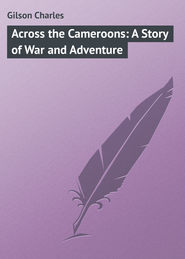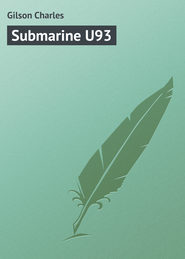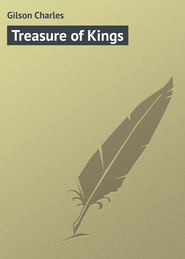По всем вопросам обращайтесь на: info@litportal.ru
(©) 2003-2024.
✖
Across the Cameroons: A Story of War and Adventure
Настройки чтения
Размер шрифта
Высота строк
Поля
At last, breathless, exhausted, he sighted the extremity of the great West African bush. Through this, forcing his way among the thickets, so that the sharp thorns tore his naked flesh, he was obliged to travel for many miles before he found the right kind of creeping plant, and, moreover, one long enough to suit his purpose.
To cut this from the tree around which it was twined, and roll it into a great coil which he suspended around his neck, was the work of not many minutes; and then he set forth upon his return journey to the margin of the desert.
He was already much exhausted, and his load was very heavy. But hour by hour he struggled onward, leaving the jungle far behind, mounting to higher altitudes. Nightfall found him still upon his way. Repeatedly he stumbled, and then, on a sudden, he fell full length upon the ground.
He lay quite still for several seconds, then rose slowly to his knees, lifting his eyes and hands towards the stars. For a moment he prayed silently; and, seeming to gather courage from his prayer, he rose to his feet and went on.
Soon after midnight the sky became overcast. A high wind got up and blew from the mountains, bitter cold after the tropic heat of the bush. Then the skies opened and the rain came down in sheets. But Cortes still held on, struggling towards his goal, fighting manfully against his own failing strength.
And in the meantime, throughout these two fearful days, Jim Braid and Harry waited in suspense. They could do nothing to help the man who hung, hour after hour, upon the brink of the other world.
Acting on his brother's advice, Fernando had undone the belt around his waist, and with this had lashed himself to the stoutest branch of the tree. Words fail to describe the torture he must have suffered; for, not only did he endure great pain from his broken arm, but he was tormented by a raging thirst. His cries for water were piteous to hear.
They had no means of assisting him. They could do nothing but look on in helplessness, praying for the return of the younger brother. On the second night the rain came-in torrents, as it can only rain in the tropics-and Fernando was able to moisten his parched lips by sucking his drenched clothes.
Wishing to get nearer to the poor fellow, in the hope that they might be able to comfort him, at least with words, Harry and Jim Braid climbed the spur and moved along the ledge at the top of the precipice until they were immediately above the withered tree. There, lying down upon their faces, they cried out to him to be of good courage, reminding him that the dawn approached, that his brother would soon return.
Daybreak is the hour when Life is nearest Death. It was shortly before sunrise that Fernando himself gave up all hope, and called upon God to take charge of his departing soul. He said that he was quite ready to welcome Death; he desired nothing more than to have an end to his misery and suspense. And, even as the words left his lips, the figure of his brother was seen approaching along the ledge.
At the feet of Harry Urquhart, Cortes sank, exhausted. The object of his mission fulfilled, he lost consciousness and drifted into a faint.
With all dispatch they uncoiled the long, snake-like creeper. Passing one end over a jutting pinnacle of rock, they lowered the other towards Fernando. It was more than long enough to reach the place where he lay.
With great difficulty the poor fellow managed to untie his belt and make fast the end of the creeper around his waist. And then they had to wait a long time, until Cortes, who had recovered consciousness, was able to assist the two boys in hauling up the rope.
This was no easy matter, since they had neither a good foothold nor much space upon the terrace. But in the end they succeeded, and the rescued man lay panting on the ledge. He was immediately given water to drink; and when he had drunk, a smile slowly overspread his face, and he looked at the brother who had saved his life. But no word of gratitude ever passed his lips; his thanks-far more eloquent than words-were in his eyes. And the dark eyes of a half-caste are the most expressive and the most beautiful in the world.
CHAPTER XXXVI-The Twelfth Hour
Owing to the exhausted state of the two guides, the party could not set forth upon their return journey to the Caves of Zoroaster until the afternoon of the following day.
The powers of endurance of both men had been taxed to the utmost-the elder, by the terrible ordeal through which he had passed; the younger, by his almost superhuman efforts.
In spite of that, Harry Urquhart was all anxiety to be off. He had often pictured to himself the agony of suspense that all this time von Hardenberg was being called upon to bear. The boy wondered if the lamp which the Prussian had taken with him into the vault still burned. If so, it would shed its light upon the glittering treasure. If it had gone out, the Prussian was buried in unutterable and eternal darkness-eternal, since escape was beyond the bounds of possibility. That, combined with the fearful silence that reigned in the place, with hope dying in the prisoner's heart as the days rolled slowly by, was enough-as it seemed to Harry-to drive any man to madness. The boy found it impossible to forgive his cousin, who had acted so basely from the first; for all that, he was by no means heartless, and, in any case, it was his duty to save a human life from so terrible an end.
As soon as the guides professed themselves able to undertake the journey, they set off towards the caves. It took them more than two days to accomplish what the younger guide had done in under twelve hours, and thence, striking due south-west, they approached the caves from the opposite direction to that in which they had first entered Maziriland.
On this occasion they saw-though they did not come into actual contact with-several of the Maziri peasants who were working in the cultivated tracts of country that lay between the mountains and the bush. Maziriland was very sparsely populated-the race verging on extinction-and at least two-thirds of the inhabitants were congregated in the chief town, where they carried on certain industries, their skill in which they had inherited from the ancients.
It approached the hour of daybreak when Harry Urquhart and his party reached the foot of the great flight of steps that led to the entrance to the caves, where stood the two carved giants. Harry had hurried forward, closely followed by Braid. The two guides brought up the rear.
In feverish excitement, three steps at a time, the boy dashed up the steps between the weird, fantastic statues, and was about to enter the cave when he remembered that he had no light, and that, since it was night, the place would be unutterably dark. He had retraced his steps some distance, with the object of getting some kind of torch, when he was met by Fernando at the head of the long flight of steps.
"A light!" he cried. "It is quite dark within."
Fernando had foreseen this, and in mid-valley had broken a branch from a cork-tree, which he had damped with rifle oil. This he now lighted and gave to Harry, who was the first to enter the cave.
Inside, everything was exactly as they had left it. It was manifest no one had visited the place since the tragedy of some days before. The body of the old man lay still at the foot of the altar. At the farthermost end of the cave the granite wall remained as ever, immobile and formidable. Harry Urquhart, taking the Sunstone from his pocket, asked Jim to hold the torch, and himself went to the wheels and turned them until the characters that showed above the golden bar corresponded with those upon the Sunstone.
When he came to the ninth wheel he was so excited that his hand was shaking. And presently there came the sharp "clicking" sound that they had heard before, and then the granite rock began slowly to revolve.
The rock evidently turned upon a pivot. Its motion was like that of an enormous water-wheel, except that, instead of revolving vertically, it turned horizontally, the way of the sun. When the centre of the opening was immediately opposite the altar there came a second "click", and the rock remained quite still.
Harry Urquhart, in breathless haste, snatched the torch from the hands of his friend, and dashed like a madman to the entrance.
He pulled up in the nick of time, noticing that he stood at the top of an exceedingly steep and narrow flight of stairs. Had he gone on as impetuously as he had started, he would have pitched head foremost down the steps.
He began to descend more cautiously. The steps were slippery from the moisture that invaded the rock in which they had been cut.
He had not descended more than three steps before he was brought to an abrupt standstill. It was as if his heart ceased to beat. From far below-so far away as to be quite faint, though unmistakable-there came to his ears the report of a single shot.
CHAPTER XXXVII-Too Late!
The boy hastened down the narrow steps with all the speed he could, Jim Braid following close upon his heels. The two guides had remained above. Even yet, both regarded the place with superstitious awe.
The steps led downward-as it seemed an interminable distance. At first they were straight; then they were spiral; then they were straight again and broader. At the bottom was the vault where, as rumour had it, the great sage himself lay buried, where was gathered together the treasure that had been given in offerings during his lifetime, thousands of years before.
At the foot of the steps, the two boys, side by side, stood spellbound. The sight that they beheld was at once tragic and marvellous.
The vault was a rectangular room about thirty feet long and twenty feet wide. Against the wall facing the steps was a huge stone that resembled a coffin, supported upon a pedestal, cylindrical in shape, and about six feet in height. The coffin and the pedestal on which it stood resembled in shape the letter T. At the foot of the pedestal was a large marble basin, in the centre of which a small jet of water played like a miniature fountain, uttering a never-ceasing bubbling noise that sounded strange in the silence of the vault.
The walls were of bare rock. On the ceiling was carved a number of fantastic figures, similar to those that stood on either side of the great stairway that led to the entrance of the caves. But the wonder of the vault was on the floor, the whole of which was covered inches deep in glittering, sparkling gems. There were sapphires, rubies, diamonds, opals, and pearls. The former worshippers of Zoroaster had called upon the treasure-houses of the ancient world to pay their tribute to the genius of the teacher. They had visited the pearl-fisheries of the East and the ruby-mines of Burma; they had brought gold from Ophir and emeralds from the land of Punt.
And in the midst of this dazzling treasure, half-buried in the gems he had ventured so much to gain, lay Captain von Hardenberg, who, dying by his own hand, had delivered up the life he had so abused.
Full length upon his face, upon this brilliant, jewel-bespangled carpet, was the man who had stolen the Sunstone, who had betrayed his country, and who, in his own turn, had been betrayed by the very ruffian he employed. A revolver, still smoking, was in his hand. Carl von Hardenberg had placed himself at last beyond the reach of human law.
It is easy to imagine the torment the man had suffered during the last days of his ill-spent life. The lamp which he had carried with him from the altar in the cave had long since burned out, and now stood upon the coffin of Zoroaster. The mental agony he endured must have driven him near to madness. The darkness, the utter hopelessness of his terrible situation, the fearful stillness-accentuated rather than broken by the never-ending bubbling of the fountain-had no doubt driven him to take his own life in savage desperation.
He had eaten all his food. He had had water in plenty to drink; but he had no doubt given up all hope of ever being rescued.
Both Harry and Jim uncovered their heads. They stood face to face with the still form of one who had always been their enemy, who had been the enemy of their country. Von Hardenberg stood now in the presence of his Maker.
They buried him at the foot of the great steps that led to the Caves of Zoroaster; and there Harry Urquhart-who had a little thumb-nail Prayer Book in his pocket-read the funeral service over the grave, whilst Jim Braid and the two guides, who had served them so faithfully throughout these long adventurous weeks, stood by in silent reverence.
There was now nothing they could do but retrace their steps to the Cameroons. They could not hope to take all the treasure with them, since they had no means of carrying it over the mountains and through the density of the bush. They had travelled thus far to see justice done, to prevent infinite wealth from falling into the hands of the enemies of England; and in this enterprise they had been successful-that much in itself was a reward. None the less, there was no reason why they should not take with them as many jewels as they could carry, and accordingly, selecting many of the largest and most valuable gems, they filled their haversacks and pockets.
And then, ascending the stairs and using the Sunstone as a key, Harry closed the vault so that no one-not even the Maziris themselves-could open it. And there was something almost sacred-or at least awe-inspiring-in the deed. For centuries the Shrine of Zoroaster had remained unmolested. Except the successive guardians of the cave, no human being had ever entered the vault and beheld the glittering treasure. In bygone times these priceless jewels had been delivered up in tribute to one of the world's greatest teachers; and now, in one sense, they were like flowers upon a grave. It was well that the greater part of the treasure should remain where it had lain throughout the ages; there was wealth enough for them in what they were able to carry with them.
With the return journey to the coast we are not concerned. The party accomplished the march in fairly easy stages; and travelling southward, for two excellent reasons, was a far more simple affair than advancing towards the north: for, firstly, they were able to utilize the rivers that flowed down from the mountains; and, secondly, the whole country was now in possession of the British troops. The German Cameroons was no more.
CHAPTER XXXVIII-Conclusion
Exactly two months after the arrival of our adventurers at Dualla, Jim Braid, cap in hand, approached his father's cottage.
It was about eight o'clock at night, and quite dark. He had come from London that afternoon, and had walked from the station. Harry, who had travelled with him, had been met by Mr. Langton's dog-cart. But Jim preferred to walk; he desired time to brace himself for the interview which was to take place between himself and the father who had treated him with such blind and harsh injustice.
The cottage windows were illumined. Softly he opened the door and looked in. His mother was seated by the fire.









